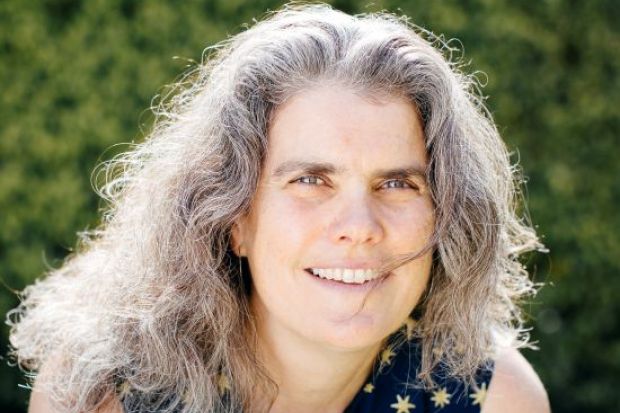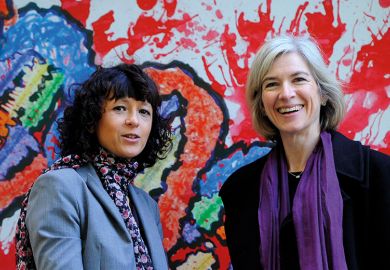A product of private education from nursery school through to her doctorate, astrophysicist Andrea Ghez credits public institutions with helping her become only the fourth woman to win a Nobel Prize in Physics.
“I’ve come to understand the advantages” of the diversity of publics, the long-time University of California, Los Angeles professor said in an interview as she collected her award at the Swedish consulate in San Francisco.
“At UCLA,” she said of her home since 1994, “there’s a lack of a commitment to tradition, which really makes space for new ideas and new people in leadership positions.”
Professor Ghez received the honour for her work, accomplished with her University of California colleague Reinhard Genzel, in discovering and rigorously confirming that a black hole sits at the centre of the Earth’s Milky Way galaxy.
The achievement showcased not only her world-class scientific ability, but a level of determination and self-belief she credited to her parents and a supportive female mentor back in high school.
While considering applying to the Massachusetts Institute of Technology, Professor Ghez recalled being told by her high school counsellor at the University of Chicago Laboratory Schools that MIT didn’t accept many women. But her chemistry teacher, Judith Keane, told her to do it anyway.
“I remember being so upset, and going to talk with her,” Professor Ghez said of Ms Keane. “And she said something I’ll never forget, which is: ‘What is the worst thing that they can do, which is say no. Why would you ever stop yourself from trying, just because somebody is sceptical?’”
More than a decade later, after graduating from MIT and earning her doctorate in physics from the California Institute of Technology, Professor Ghez put that advice into practice with even bigger results.
Just beginning her faculty career at UCLA, she asked Hilton Lewis, then head of the control systems at the W. M. Keck Observatory on the top of Hawaii’s Mauna Kea – the world’s largest optical and infrared telescopes – to completely reprogramme his computerised operations to remove the effects of the atmospheric turbulence.
It was an “outrageous request”, Mr Lewis recently wrote, with the “waste of time” goal of finding a black hole in the middle of the Milky Way. Yet Professor Ghez was a “force of nature” with “unwavering determination”, said Mr Lewis, now Keck’s overall director, and he ultimately relented.
Now it’s Professor Ghez’s turn to contemplate big new directions. Admirers worldwide, especially young girls, want to hear her life story and learn from it. Native Hawaiians are battling astronomers over their use of Mauna Kea. And the incoming Biden administration has been seeking her advice on how hard to fight for the funding of basic scientific research.
In all three, Professor Ghez saw the Nobel Prize delivering her an important new measure of public voice, huge demands on her time and difficult questions over how best to fit them into a star-filled career.
Among the most wrenching were the requests from around the world to speak at girls’ schools. “To me,” she said, “it’s a question of how do you do this effectively, and I don’t have an answer to that yet.”
At Mauna Kea, which many native Hawaiians regard as sacred ground, her profession is stuck in a long-running battle to build a new billion-dollar telescope. Because of their need for remote locations, she said, astronomers often found themselves in such conflicts with environmentalists or indigenous peoples.
With her newfound authority, Professor Ghez suggested, she may pressure the University of California to get more involved, given the expertise universities have in fields suited to understanding indigenous perspectives and finding space for compromise. “I think UC should step up to this,” she said.
She also has met with representatives of the Biden transition team focused on federal investment in science. A chief concern there is a proposal with bipartisan support in Washington that could create a new division of the National Science Foundation (NSF) focused on applied science.
The idea has been put forth as a means for keeping the US economically competitive with nations that exploit the scientific discoveries that other countries finance. While it’s a tempting shortcut, Professor Ghez said, policymakers should recognise it as a potentially dangerous route to pursue. “You just need to be very thoughtful with that kind of change,” she said.
She is comfortable, however, with moving on from the famed Arecibo Observatory in Puerto Rico, despite a petition asking the NSF to rebuild its beloved hurricane-damaged radio telescope reaching its 100,000-signature goal.
“These are painful and difficult decisions,” Professor Ghez said. But, she said, “if you want to build your next new thing, you have to think about what you’re going to phase out”.
POSTSCRIPT:
Print headline: Nobel winner Ghez credits publics’ open attitudes
Register to continue
Why register?
- Registration is free and only takes a moment
- Once registered, you can read 3 articles a month
- Sign up for our newsletter
Subscribe
Or subscribe for unlimited access to:
- Unlimited access to news, views, insights & reviews
- Digital editions
- Digital access to THE’s university and college rankings analysis
Already registered or a current subscriber?







